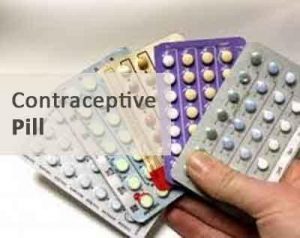- Home
- Editorial
- News
- Practice Guidelines
- Anesthesiology Guidelines
- Cancer Guidelines
- Cardiac Sciences Guidelines
- Critical Care Guidelines
- Dentistry Guidelines
- Dermatology Guidelines
- Diabetes and Endo Guidelines
- Diagnostics Guidelines
- ENT Guidelines
- Featured Practice Guidelines
- Gastroenterology Guidelines
- Geriatrics Guidelines
- Medicine Guidelines
- Nephrology Guidelines
- Neurosciences Guidelines
- Obs and Gynae Guidelines
- Ophthalmology Guidelines
- Orthopaedics Guidelines
- Paediatrics Guidelines
- Psychiatry Guidelines
- Pulmonology Guidelines
- Radiology Guidelines
- Surgery Guidelines
- Urology Guidelines
Contraceptive pills may make women prone to depression

Hormonal contraception, including birth control pills or implants, may increase a woman's odds of depression and antidepressant medication use, according to a large study of Danish women.
Based on data about prescription drug use for more than 1 million women, researchers found that those who started using hormonal contraception were significantly more likely to subsequently get a first-time prescription for antidepressant medication, compared to women not on hormonal contraception.
For adolescent girls, starting on hormonal contraception was tied to an even greater increased risk of antidepressant use. Depending on the type of hormonal contraception, there may have also been a link to risk of being diagnosed with depression.
"Such a comprehensive study on this issue hasn’t been made before," said senior author Dr. Ojvind Lidegaard, of the University of Copenhagen.
Previous studies have tried to clarify connections between contraceptive hormones and depression, Lidegaard and his colleagues write in JAMA Psychiatry, but these produced mixed results.
The authors point out that the lifetime prevalence of depression is about double among women compared to men. That difference doesn't emerge until after puberty, though. Two female sex hormones estrogen and progesterone are thought to be factors in that increased risk once the reproductive years begin.
Lidegaard and his colleagues used data from the ongoing Danish Sex Hormone Register Study, which includes all women living in Denmark. The new piece of research includes women who were ages 15 to 34 years from 2000 through 2013.
Any women with a diagnosis of depression that occurred prior to 2000 were excluded from the analysis, as were women with any other major psychiatric diagnosis.
The included women were followed for around seven years each. About 55 percent used hormonal contraception during the study period. During that time, 133,178 women were first prescribed antidepressant medications and 23,077 were first diagnosed with depression.
Compared to women who didn't use hormonal contraception, those who used birth control pills were 23 percent more likely to be prescribed an antidepressant medication for the first time during the study period.
Those using birth control pills that only contained the hormone progestin were 34 percent more likely to be prescribed antidepressant medications. For women using a birth control ring, the increased risk was 60 percent and it was doubled among those using a birth control patch.
These risks were also slightly higher among adolescents, the researchers found.
Compared to girls 15 to 19 years not using hormonal contraception, the researchers found an 80 percent increased risk of being prescribed antidepressant medication for the first time among girls using birth control pills.
The risk was about 120 percent higher among those using progestin only birth control pills.
While the overall risk of being diagnosed with depression was generally the same or lower regardless of the type of birth control women used, the researchers did find some increases in the first diagnosis of depression for women using specific types of hormonal contraception.
Lidegaard said past studies of women on hormonal contraception may not have found differences in depression treatment or diagnosis because women who experience mood changes after starting hormonal contraception often stop taking the pills and become non-users again.
The researchers caution that their findings are limited by several factors, though. For example, the fact that antidepressant medications are sometimes prescribed for reasons other than depression. Also, depression is listed as a potential side effect of hormonal contraception, they write, so these drugs and devices might not be prescribed as often to women already at risk, which would mean the real depression risk is higher than indicated by these results.
"All women, doctors and contraception advisers should realize we have this potential side effect in the use of hormonal contraceptives," Lidegaard said.

Disclaimer: This site is primarily intended for healthcare professionals. Any content/information on this website does not replace the advice of medical and/or health professionals and should not be construed as medical/diagnostic advice/endorsement or prescription. Use of this site is subject to our terms of use, privacy policy, advertisement policy. © 2020 Minerva Medical Treatment Pvt Ltd